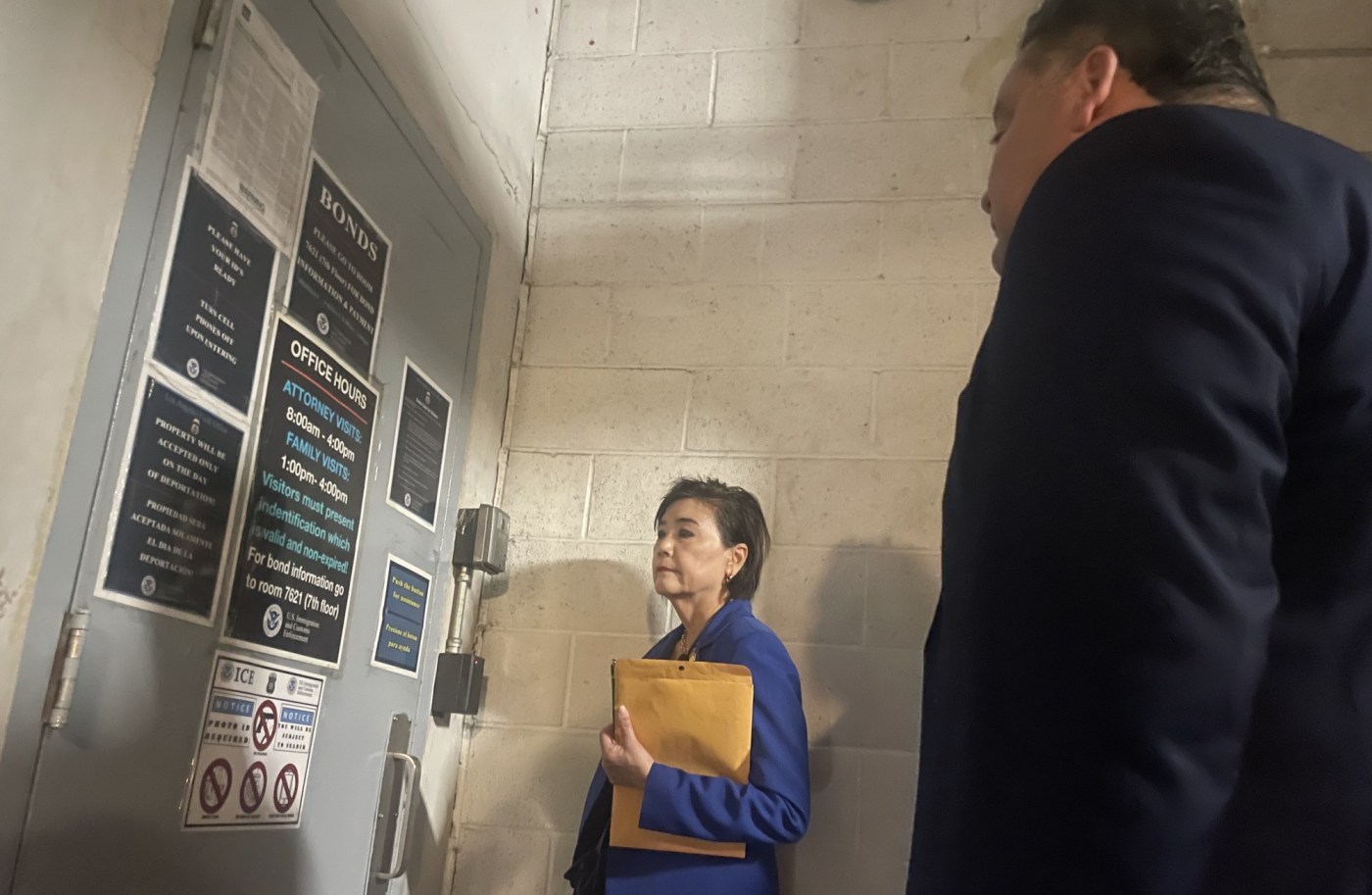The Department of Homeland Security has imposed new limits on visits by members of Congress and their staff to immigration enforcement facilities, intensifying a conflict between federal immigration officials and Democratic lawmakers.
In guidance released this month, Immigrations and Customs Enforcement asserts that it has broad power to “deny a request or otherwise cancel, reschedule or terminate a tour or visit” by lawmakers or their staff under a number of circumstances, including “operational concerns” or if “facility management or other ICE officials deem it appropriate to do so.”
Under existing law, members of Congress can make unannounced oversight visits to immigration facilities that “detain or otherwise house aliens.” But the new policy specifies that ICE field offices are not subject to those requirements. Detained immigrants have been held in some of those offices for days waiting for officials to process their cases.
The new protocol, updated since February, comes as Democratic lawmakers have repeatedly been denied access to ICE facilities this month as they try to conduct congressional oversight, and amid high-profile clashes between federal immigration officials and members of Congress.
Democratic lawmakers in California, Illinois and New York have been turned away from ICE facilities recently, sometimes after trying in vain for hours to gain access to buildings that they say they are authorized to visit.
Representative LaMonica McIver, Democrat of New Jersey, was charged with assault last month after an encounter with immigration officers outside a Newark detention center. And Sen. Alex Padilla, Democrat of California, was shoved out of a room and handcuffed after trying to question Kristi Noem, the homeland security secretary, during a news conference last week.
Rep. Judy Chu, D-Pasadena, along with four other members of Congress, this week called on operators of the Adelanto ICE Processing Center, near Victorville, to improve conditions for the roughly 1,200 detainees being held within its walls after heightened enforcement efforts in the region. And on Wednesday, she led a small delegation of local leaders to the Edward R. Roybal Federal Building in downtown Los Angeles, where they demanded answers regarding the ICE detention of six immigrants picked up in a raid in the city of Pasadena earlier in the day.
Rep. Mark Takano of Riverside speaks during a press conference at the Adelanto ICE Processing Center on Tuesday, 17 2025. Five democratic lawmakers toured the facility to discuss the conditions and detainee treatment at the facility. (Photo by James Quigg, Contributing Photographer)
Those answers were repeatedly denied as Chu, speaking through an intercom system outside a basement detention area at the federal building, tried five times to get access. Each time, a voice from the other side denied those attempt. And often answers simply didn’t come. She left with no answers as to what criminal charges the men were picked detained on.
“I’ve spent over a decade working to shut down the Adelanto ICE facility in my home state because of horrific conditions,” she said in an emailed reaction on Thursday. “My most recent visit showed little has changed. I’m relieved I was finally allowed in, but it raises a serious question: why is DHS making it so difficult for Members of Congress to access these sites? ICE offices are detaining migrants and, at times, U.S. citizens for days. That qualifies them as detention facilities, which are subject to Congressional oversight.
“This new DHS policy claiming otherwise is simply false,” she added. “Right now, DHS is undermining the law to block oversight, and that signals authoritarianism. I won’t let it stand.”
Pasadena Mayor Victor Gordo also sought access, and watched as Chu cited government code in efforts to get in.
“I was stunned they wouldn’t let a member of Congress exercise her right under the Constitution of the United States to oversee the operations,” he said. “That’s disenfranchisement of not only a member of Congress but of the people who elected her. They denied the people’s representative to do that.”
Representative Bennie Thompson of Mississippi, the top Democrat on the Homeland Security Committee, criticized the new ICE policy as an attempt to skirt congressional oversight. In a statement, he said the new guidance was “an affront to the Constitution and Federal law.”
Thompson singled out the guidance on field offices, which he called a “smoke screen” to prevent members from visiting offices that “are holding migrants — and sometimes even U.S. citizens — for days at a time.”
Representatives for the Department of Homeland Security did not immediately respond to a request for comment.
The new guidance spilled into public view across the nation as well. On Wednesday, four Democratic representatives were denied access to an immigration processing facility in suburban Chicago, where they believed immigrants were being held for days without access to lawyers.
Rep. Judy Chu talks to a federal Homeland Security officer on Wednesday, June 18. Photo: Ryan Carter, SCNG
Reps. Jerrold Nadler and Dan Goldman, Democrats of New York, were both denied access to an ICE office in Manhattan, even as an official acknowledged that detainees were held there overnight. Both men said they requested a visit in advance.
“We were told not to,” William Joyce, the deputy director of the New York ICE field office, told them during an exchange in the building’s lobby.
In an email to a congressional office this week, an ICE official said that federal immigration officials were “not facilitating any visits to ICE Field Offices or suboffices” currently because of their “high operations tempo,” according to a congressional aide who was not authorized to discuss the message publicly.
Democratic lawmakers have said that the Trump administration’s escalation is precisely the reason they want to visit facilities, and that the federal government’s large-scale immigration crackdown and accelerated deportation efforts demand more thorough oversight.
For months, Democrats have framed their efforts to access immigration detention and enforcement facilities as part of their constitutional duties to provide a check on the expansion of presidential power.
Under the new guidance, ICE also asks for at least 72 hours notice for a visit to its facilities. Existing guidance already required congressional staff to provide at least 24 hours notice before visiting a detention facility.
The agency also explicitly says that visitors cannot “have any physical or verbal contact with any person in ICE detention facilities” without prior approval, and that violating that policy could lead to tours being cut short.
Related Articles
East Bay city struggles to allocate $1 million in immigrant relief funds
Philp: California Democrats defend immigrant health care but need a broader agenda
Appeals court says President Trump can mobilize California National Guard
ICE agents denied entry to Dodger Stadium by team
‘Highly sophisticated’ border tunnel found under California-Mexico port of entry
The New York Times and SCNG Staff Writers Beau Yarbrough and Ryan Carter contributed to this report.





